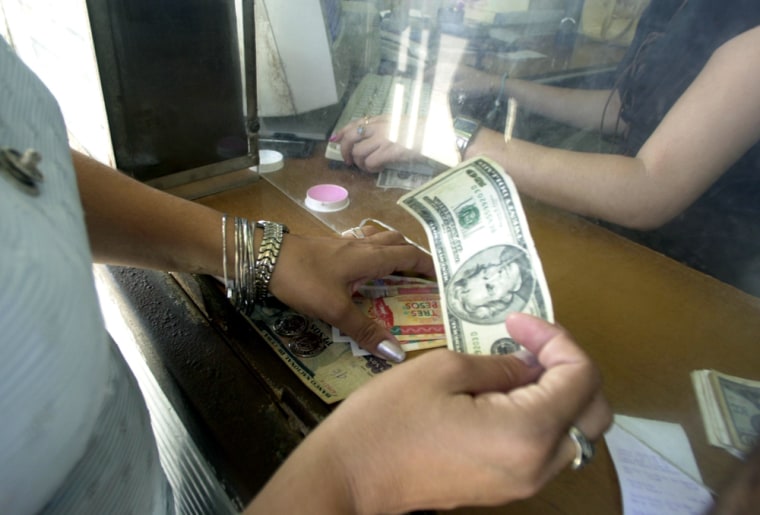Everyone in Havana wants answers to the same basic question: Will the new government ban on U.S. dollars make life harder?
Starting Nov. 8, Cuban stores and restaurants will no longer accept the American currency as legal tender. Instead, the local convertible peso becomes king, ruling over all international hard currencies, even though it carries no purchasing power off the island.
However Cuba remains a dual currency economy, with both the convertible peso and the national peso in circulation. Most Cubans earn the national peso valued at 27 to 1 convertible peso, which continues to exchange 1 convertible peso to 1 U.S. dollar. So, for instance if someone exchanges 100 U.S. dollars today, they will be given 100 convertible pesos.
After a two-week grace period, nationals and tourists alike will be penalized a 10 percent handling fee when they go to convert the U.S. currency at government exchange houses.
Cuban leader Fidel Castro announced the protectionist measures Monday as part of a drive to restructure the country’s foreign reserves in light of tightened U.S. trade sanctions.
Hedging bets
But consumers, like Abraham Salgado, are nervous about ending the 10-year love affair with the American dollar. “There’s nothing better,” said the 42-year old waiter, leery about changing his entire $5,000 savings into Cuba’s softer currency.
“I’m going to bet on both horses. Change some money but not deplete all of it.” He’s gambling that at some point in his life U.S.-Cuba relations will thaw and the dollar will resurface.
Juan Carlos Rodriguez, 40, who operates a small auto body shop from his home, thinks the idea “stinks." Even though he spends all of his hard currency earnings in Cuba, he confessed, “I don’t trust the chavito" — Cuban slang for monopoly money.
He’s not alone. According to sociologist Aurelio Alonso, Cuban society tends to overrate the dollar, an outgrowth of its “fetish” with the U.S. currency.
Need to shift confidence
Alonso, a senior researcher at Havana’s Center for Psychological and Sociological Studies, tracks that thinking back to 1993 when the government legalized the dollar. “Everything then was in short-supply. The dollar began circulating and that gave people options.”
Since 90 percent of the population with access to U.S. dollars spends locally, Alonso sees this shifting with time. “The convertible peso will recover prestige in the local economy once people see that it holds the same buying power as the U.S. dollar.”
At first consumers may feel “uncertainty and confusion," warned Michael Lebowitz, Professor Emeritus at Simon Fraser University. It all hinges on the Cuban government’s ability to convince the public that the peso retains power in the market.
In a web-based news site CubaNews, Lebowitz called the move “very rational” to cope with “serious problems," stemming from rising oil prices, the weak dollar, failed sugar exports, this year’s hurricane damage and “relentless” White House moves to “destroy” the island’s economy.
Since May, when the Federal Reserve fined UBS, Switzerland’s largest bank, $100 million for illegally transferring new dollar notes to Cuba and other U.S. sanctioned countries, the Castro government has been challenged to manage its income from family remittances and international tourism.
For Cuban economist Lazaro Suarez anything that “cuts the island’s dependence on the U.S. dollar” is a good thing. “This should have been done a decade ago,” said Suarez.
According to Suarez, financial experts here consistently urged dumping the U.S. dollar for other stronger currencies.
“That way we don’t risk finding ourselves in foreign banks with devalued American dollars or blocked from depositing our reserves… To the degree that we’re not engaged in dollar-based transactions, we’re not defending the dollar.”
At a moment when the dollar is caught in a downward slide, “there’s no better moment than the present," said Suarez, who works as a consultant to foreign companies interested in doing business on the island.
Adjusting to sudden change
Planners, like Suarez, may have harbored this idea for years, but its apparent suddenness unnerved the nation. The announcement bumped Fidel Castro’s recent accident from the number one talked-about topic at bus stops, barber shops and bakeries.
With his arm in a sling, Fidel Castro personally made the announcement — appearing on national television just five days after he fell and fractured his knee and arm. The 78-year old leader argued that banishing the dollar would help the island regain control over the economy.
He even suggested Cubans urge their relatives to send family remittances in other hard currencies like euros or the British sterling. This alone could remove up to $1 billion a year from circulation, the amount 40 percent of the Cuban population is said to receive annually from family living abroad.
Havana veterinarian Arelys Estevez, 53, took those words to heart, asking her mother in Miami to send Canadian dollars in place of the $100 U.S. stipend she sends monthly. "That buys food and shoes for her grandchildren and great-grandchildren."
Like other Cubans with U.S. dollars, she rushed Tuesday to change her small savings only to be told to return later in the week. Apparently, there were not enough convertible pesos on hand to satisfy demand.
